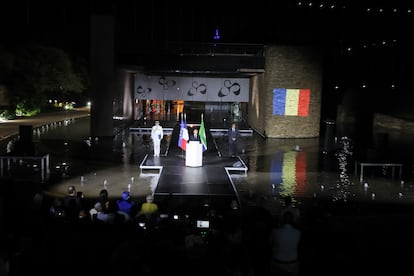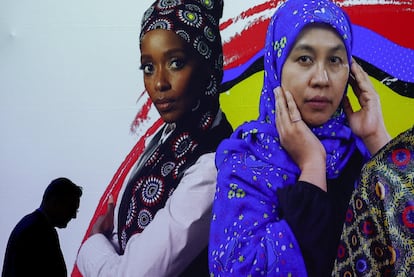The G-20, the forum that brings together the world's leading economies, is scheduled to hold its annual summit this weekend in Johannesburg, where the South African presidency is attempting to make progress on issues of interest to the Global South. However, the meeting is being shaken by the geopolitical earthquake of the US plan for Ukraine. European leaders and Ukrainian President Volodymyr Zelensky have launched urgent consultations to design a joint response to the plan formulated by the White House without consulting them. European Commission President Ursula von der Leyen has indicated that European leaders will hold a meeting on the sidelines of the summit this Saturday.
“We have spoken with Zelensky. We discussed the current situation and it is clear to us that no decisions should be made about Ukraine without Ukraine,” Ursula von der Leyen and António Costa, President of the European Council, stated in a joint message. The Ukrainian president, for his part, also held a joint telephone conversation with the President of France, the German Chancellor, and the British Prime Minister.
Two of the key figures in the diplomatic standoff surrounding Ukraine, Donald Trump and Vladimir Putin, will not be at the Johannesburg summit, which is marked by prominent absences—also missing will be the leaders of China, Xi Jinping, and Argentina, Javier Milei, and the Mexican president, Claudia Sheinbaum—clouding the prospect of reaching significant agreements at the meeting. However, the participation of the main European leaders is expected.
The genesis of Trump's plan and the contemporaneous absences of key leaders in Johannesburg are emerging as emblematic of a world increasingly governed by power dynamics and bilateral relations. Trump has given Zelensky a week to respond to the plan with a gesture that feels like an ultimatum.
The G-20, a group representing 87% of global GDP and 62% of the world's population, is an organization without executive power, but since the 2008 crisis, it has been an important instrument for international coordination among the world's leading economies in an increasingly interconnected world facing challenges that cannot be resolved without transnational cooperation. Therefore, its declining effectiveness is a worrying sign. Below are some of the key takeaways from the summit beyond the Ukraine crisis.

Absences
The South African meeting will have the most glaring absences since the group's inception two decades ago. Specifically, it is the first time a US president will be absent. Donald Trump justifies his absence by protesting the alleged persecution of white South Africans, a blatant manipulation of easily verifiable facts.
Trump has also decided that no other US representative will attend the summit, which presents a significant diplomatic challenge since the forum operates by consensus, and a joint declaration seems unlikely under these circumstances. It is not, therefore, a boycott directed at the G-20 itself, whose rotating presidency the US will assume next, but it is a torpedo below the waterline of this summit.
Xi Jinping has also decided to skip the summit. He did not attend the 2023 summit in India, a snub to New Delhi. This time, his absence is causing even greater diplomatic perplexity, as he could have gained prominence by filling the void left by the US, but Xi likely did not want to be at a summit without other important leaders and with a chaotic negotiation process. At least Beijing will be represented by its prime minister, Li Qiang.
As is customary, Vladimir Putin will not participate, since the international arrest warrant against him would expose him to detention. However, it is significant to note that this time he has decided not to send his Foreign Minister, Sergey Lavrov, as on previous occasions, but rather a lower-ranking representative.
Adding to the list of absences are Argentine President Javier Milei, who remains faithful to the path set by his economic rescuer, the US, and Mexican President Claudia Sheinbaum, who follows the lead of her sponsor, Andrés Manuel López Obrador, who was not traveling anywhere for diplomatically difficult-to-understand reasons. This situation leaves room for the EU and India to present themselves as the most committed supporters of international cooperation.

Goals
The South African presidency has focused on prioritizing key objectives for Africa and the Global South throughout a year of preparatory sessions for the summit. This will be the fourth consecutive summit held in the Global South—Indonesia, India, Brazil, and South Africa. The presidency's priorities include action to strengthen resilience and response to climate change-induced disasters; debt sustainability for low-income countries; mobilizing financial resources for a just energy transition; and designing a framework for the sustainable and inclusive exploitation of critical minerals.
Naturally, other members have different priorities. The EU, for example, is pushing hard for action on the issue of China's overcapacity in industrial production, fueled by massive state aid, which is flooding so many markets around the world with goods, and on the need for international trade based on rules and arbitration institutions.
Tensions
On a substantive level, there have been frictions across a wide range of issues. The usual tension persists between countries that want the G-20 to adopt a position of clear political impetus for the energy transition—such as Brazil and South Africa—and those that resist—Russia and Saudi Arabia.
Another area of tension is gender issues, specifically regarding certain civil rights. Certain forms of resistance, which in the past remained more or less dormant, are now perceived as galvanized and unleashed by Trump's second term, which has served as a major catalyst for regressive impulses.
On a formal level, tension revolves around the format of the summit's concluding document. The South African presidency aims for a joint declaration, as is tradition, but the US protests, arguing that tradition dictates consensus. The possibility of a G-20 summit declaration is being considered—a diplomatic invention for issuing a joint document from the participants. The alternative, which would represent a failure, would be a declaration from the South African presidency, perhaps endorsed by those who support it. The South African government is working diligently to avoid this scenario. Sources consulted by Reuters maintain that negotiators have reached an agreement on a text, but its content and the form in which it will be presented by the leaders remain unknown.

